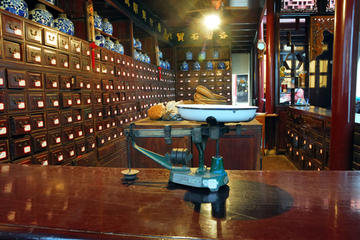Museum of Traditional Chinese Medicine (Hu Qing Yu Tang Chinese Medicine Museum)
TIME : 2016/2/22 10:12:43

Museum of Traditional Chinese Medicine (Hu Qing Yu Tang Chinese Medicine Museum)
If you’ve ever wanted to create your own pills or learn how medicine made of seahorses may be good for your kidneys then this museum is the place for you. Located at the base of Hangzhou’s Wu Hill, the Museum of Traditional Chinese Medicine (Hu Qing Yu Tang Chinese Medicine Museum) started as a pharmacy in 1874 by a local businessman and imperial court official, Hu Xueyan. Still serving as a functioning pharmacy, the entire compound has been expanded to include an exhibition hall which details the history of traditional Chinese medicine as well as a medicine preparation hall where visitors can try their hand at crafting their own.
One popular method involves crushing herbs into a fine powder through the use of a steel boat grinder, operated by using your feet. Other exhibits include the revered golden shovel and silver pan: ancient instruments employed in medicine making which avoid impurities found in other types of metals.
Also on site is a health clinic where, if so inclined, visitors are able to have doctors provide health services and offer remedies for a wide range of bodily ailments. A practice which has been fine-tuned over thousands of years, the chief concept of traditional Chinese medicine revolves around balancing the functions of the body and developing a holistic understanding of the body’s relationship with the universe as described in ancient Taoism. Considered by many to be somewhat unorthodox, traditional Chinese medicine attempts to look at the body as a series of interconnected systems as opposed to isolating a single root cause of a pain or ailment.
As visitors to the museum will discover, remedies in traditional Chinese medicine can range from items as common as basic ginseng powder to those as strange as fur seal oil or even the hide of a donkey. In addition to prescribing herbal medicines the practice also incorporates elements of acupuncture, massage and dietary therapy into aiding and caring for a patient’s well-being.
One of the more informative sites on a tour of Hangzhou, the museum walls are inscribed with thousands of years of traditional Chinese knowledge as well as on a statue of Sun Simiao, a 7th century doctor believed to be the Father of traditional Chinese medicine.
